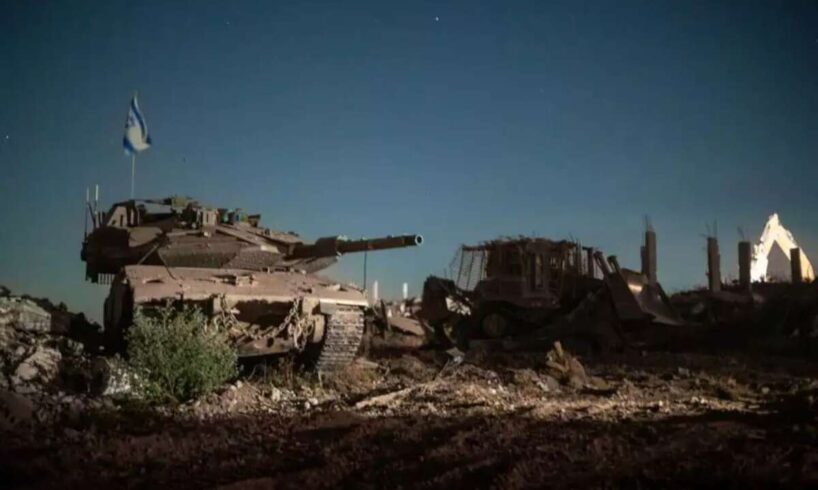
Within the IDF’s top ranks, there is widespread opposition to the next stage of Operation Gideon’s Chariots in Gaza, which is expected to begin soon. Senior Israeli officials warned that following the attempted strike in Qatar, Israel is now “endangering its national security in an unprecedented way.”
Over the weekend, the IDF intensified its airstrikes in Gaza as preparation for the ground offensive. At the same time, efforts were stepped up to encourage Palestinian civilians to leave the city, though so far only partial compliance has been noted. IDF assessments suggest that many residents will flee once large Israeli forces approach the area, but commanders fear that 100,000 to 300,000 people may remain in Gaza and significantly complicate the operation.
Strikes in Gaza City None
The army plans to call up another 20,000 reservists this week under emergency orders, mainly to replace regular army units diverted to Gaza, with some reinforcing other sectors. This comes on top of some 60,000 reservists already mobilized earlier this month. Most reservist units are being deployed in Judea and Samaria and along the Syrian and Lebanese borders, while the Gaza campaign will be led by regular combat brigades.
In recent days, the Israeli political leadership has increased pressure on the IDF to launch the offensive quickly, disregarding warnings from the chief of staff, senior generals, and top officials from the Mossad, the Shin Bet security agency, and the National Security Council. These officials doubt the operation will achieve its stated aim of defeating Hamas. They caution that the current plan could drag on for months, put Israeli hostages at risk, lead to heavy military casualties, and isolate Israel internationally due to images of destruction and civilian deaths coming out of Gaza City.
Concerns within the Israeli security establishment have grown since the attempted assassination of senior Hamas leaders in Qatar last week. The outcome of the strike remains unclear, as both Hamas and Qatar have imposed a strict blackout, but most assessments suggest the attack either failed or achieved only limited success.
Series of explosions in Doha Arab networks
According to senior officials, the strike was launched despite the objections of the chief of staff, the Mossad director, the head of Military Intelligence, and the head of the National Security Council. While all four supported the overall goal of eliminating Hamas leadership, they opposed the timing, given an American proposal for ending the war, the location on Qatari soil, and the risk of entangling Israel in a wider crisis.
The reservations voiced beforehand appear to have underestimated the scale of the damage inflicted on Israel itself. Internationally, the operation is seen as a deliberate sabotage of peace efforts aimed at securing the release of hostages and preventing an escalation of fighting. With Hamas’ leadership now underground and Qatar no longer acting as a mediator, Israel has been left with only the war option, and full responsibility for its consequences.
Beyond that, Israel has further complicated its already strained international standing. Western governments rushed to condemn the attack, while the Arab world is in turmoil over fears Israel may strike additional states that were previously thought “off-limits.” Egypt has even floated the idea of creating a regional alliance, an “Arab NATO”, for collective defense against foreign aggression. Although Israel was not mentioned by name, the implication was clear, placing it on the verge of direct confrontation with nearly all its neighbors, including countries with which it maintains peace treaties and normalization agreements.
Just two and a half months ago, after the war with Iran, it seemed such a regional alliance would be formed with Israel at its center, as a counterweight to the Shiite axis led by Iran and the Muslim Brotherhood bloc led by Qatar and Turkey. Now, Israel has managed to unite the Sunni Arab world against it, bridging even the deep hostility between Qatar, Saudi Arabia, Egypt, and the United Arab Emirates. Most alarming, this has coincided with a rapprochement with Iran, highlighted by a visit to Cairo last Friday by Iran’s foreign minister. On Monday, Qatar is set to host a major summit on “Israeli state terrorism,” with participation expected from the presidents of Iran and Turkey.
The Trump administration has refrained from joining the international chorus of condemnation, maintaining public support for Israel. Yet leaks to American media suggest unease in Washington. Over the weekend, President Donald Trump met with Qatar’s prime minister in what appeared to be a US-led reconciliation effort. A senior Israeli official admitted the episode was a devastating setback for Israel: “We managed to turn a terror-supporting state into a martyr. Instead of weakening our enemies, we strengthened them.”
President Trump. Photo: Reuters Reuters
The diplomatic fallout with Qatar adds to Israel’s mounting international problems, which are likely to intensify as the Gaza campaign expands. In Europe, there is already open talk of economic, academic, and cultural boycotts, along with the possibility of a broader arms embargo that could hamper the IDF’s operational readiness. Officials have also expressed concern about damage to Israel’s defense exports, a sector that brings in billions of dollars annually.
Senior Israeli security officials concluded that these threats amount to an unprecedented danger to Israel’s national security. The government has dismissed such warnings as fearmongering meant to block the plan to defeat Hamas. But military leaders counter that it is the government’s actions themselves that are undermining Israel’s ability to achieve decisive results and may ultimately cause Israel to lose the war, at a cost far heavier and more dangerous than it can bear.





